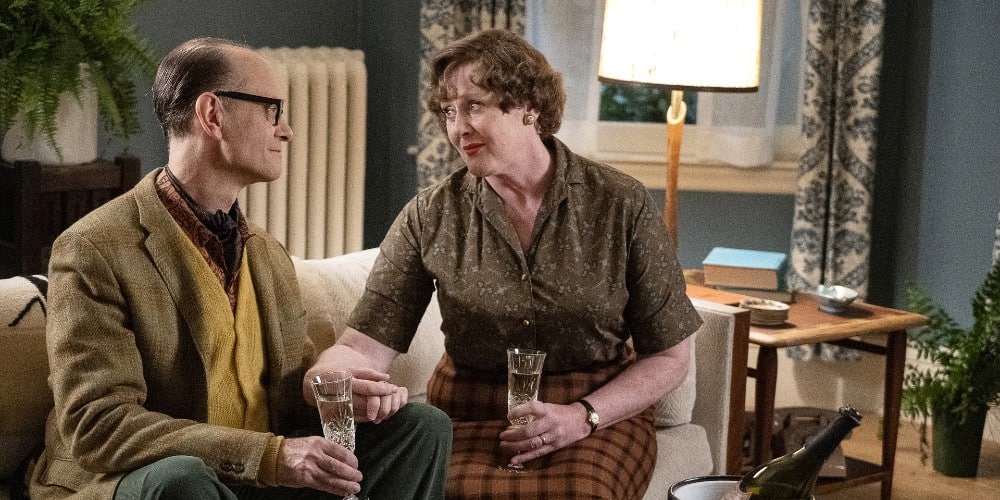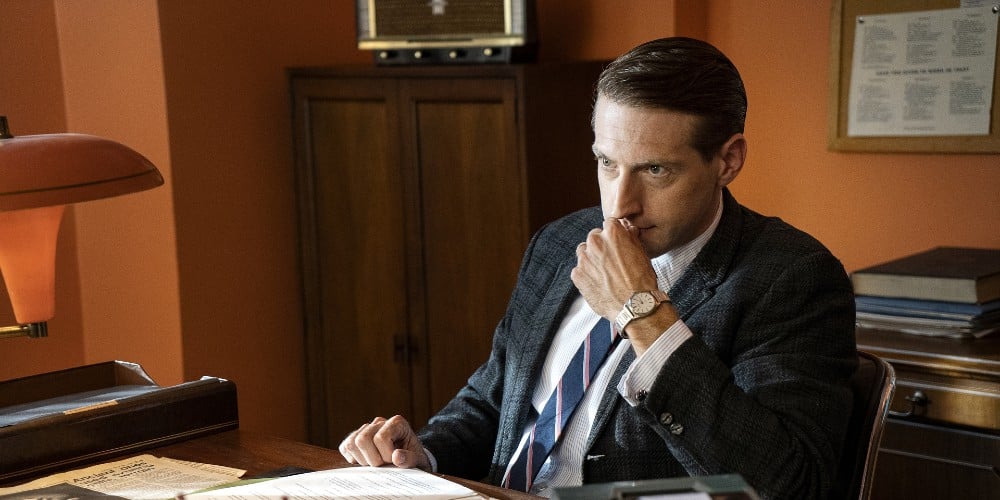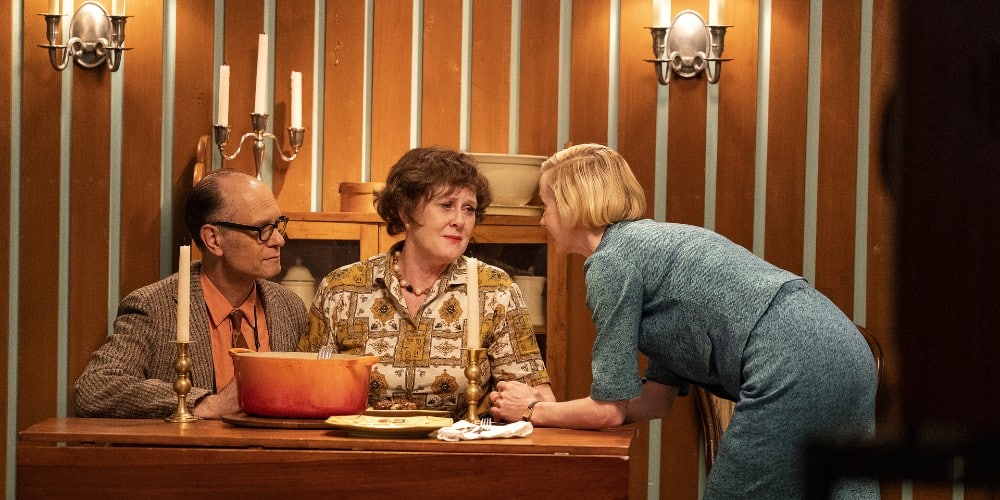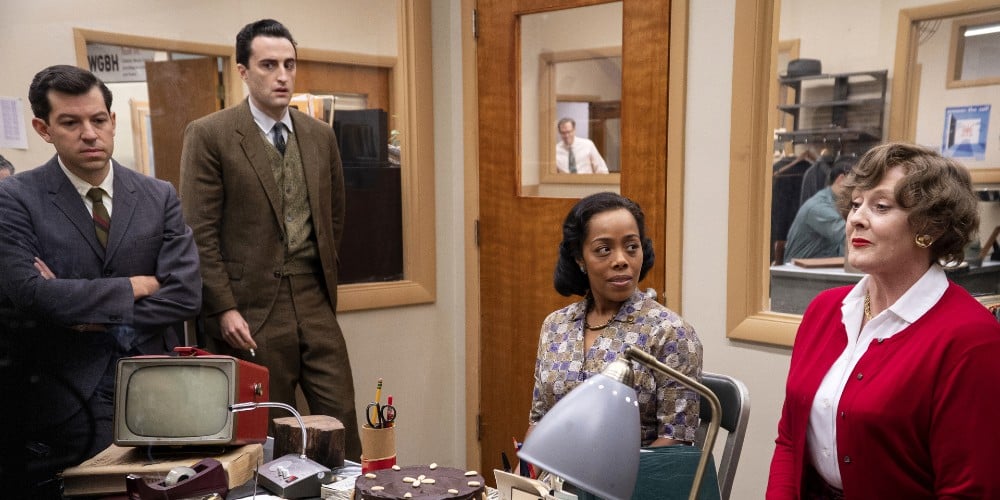Read also:
How to Watch FX Live Without CableHow To Watch AMC Without CableHow to Watch ABC Without CableHow to Watch Paramount Network Without CableJulia, a sweet-hearted series based on Julia Child’s foray into television, boasts rich performances and weak execution.
Stuck outside a closed door with her hands full, Julia Child sighs, “I have a cake. Would you mind?”
This moment, from the first episode of HBO’s Julia, when Julia can’t manage her way into the production office, is a microcosm of the show as a whole. Julia is asking to be let into our hearts and living rooms, to embrace its sweet performances and ideas. The problem is with the door.
Other retellings of the Julia Child story have focused on her life in France and the release of her monumental tome, Mastering the Art of French Cooking. This version, created by Daniel Goldfarb and Charles McDougall, smartly embraces its medium and focuses on the creation of The French Chef, Child’s genre-defining cooking TV show. Led by Dame Sarah Lancashire and well-stocked with Broadway and television legends and newcomers, Julia boasts a pantry of powerhouse performances.
The Childs have returned from France by the time they’re introduced in early-1960s Boston. Julia’s book has become an impressive success. Her husband, Paul (David Hyde Pierce), has been forced into retirement. Now they’re looking for something to fill their time.

After a whim appearance on local public television, Julia catches the bug. Alongside her wunderkind producer Alice Neman (Brittany Bradford), she charms and muscles their resistant producer Russ Morash (Fran Kranz) into filming a pilot for a program addressing the American home cook. Supported by a ragtag group of women, including her best friend Avis DeVoto (Bebe Neuwirth), superstar editor Judith Jones (Fiona Glascott), and the students from her cooking classes, Julia’s pilot season of The French Chef lays the groundwork for how she will change how Americans cook and watch cooking forever.
Lancashire has big shoes to fill. Even though the series takes a different angle than 2009’s Julie & Julia did, the specter of Meryl Streep stalks the production. Fortunately, she rises to the occasion. Lancashire is not doing an impression of Julia Child; she’s embodying her. As shown when Julia meets the first drag queen impersonating her while touring San Francisco with James Beard (Christian Clemenson), “Julia Child” is more than the honking operatics of her voice. Lancashire finds Child’s shoulders, her top-heaviness. This Julia Child has legs.
And legs are essential to carrying an eight-episode series. The role gives Lancashire the chance to play both quiet internal emotions and wild public moments that display Child’s wicked sense of humor. With that said, it’s ironic that her Julia quite often tells us that there’s no one like Julia Child. That remains true. No one can capture the baritone belltower of her voice.
While Lancashire gets close at times, she isn’t the unconscious font of knowledge Julia was. (Streep avoided this critique by playing Julia as she was learning, making for crucial differences in the requirements of their performances that make comparing the two a bad idea.) She can only approximate Child’s ease with cooking and teaching in front of the camera. Nevertheless, Lancashire’s Julia shows a perfectly buttered range of emotions and gestures that manages to bake itself into a heartwarming mold of the television titan.
Lancashire is not doing an impression of Julia Child; she’s embodying her.
As Julia’s husband and right-hand man, David Hyde Pierce is a beautiful foil to Lancashire. They make a fine couple trying to navigate the suddenly jam-packed chapter of their elder years. Pierce shows off his gifts for sincerity, melodrama, tenderness, and rage. Given the breadth afforded by a series, Paul Child gets to be more than just a Wife Guy. In Pierce’s hands, Paul is funny, complex, opinionated, a man of his times.
While I wish I could say Pierce plays best against Lancashire, it just isn’t true. His moments with Broadway pal Bebe Neuwirth absolutely crackle. Though they’re supposed to be classic frenemies jealously jockeying for Julia’s attention, Pierce and Neuwirth’s Paul and Avis are more like secret besties.
As Avis, Julia’s steadfast and self-possessed best friend, Bebe Neuwirth is as dry, brittle, and delicious as royal icing on a very theatrical cake. Never without her hair in a tight updo, Neuwirth’s Avis struggles to find her place in a world that quickly passes widows by. But by the time she tells us she’s “just getting started” with that Velma Kelly wink in her eye, we believe her thanks to the work Neuwirth has done delicately whipping her character up into stiff peaks, a woman with a new and straighter spine.
Garnishing this feast of talent are deftly placed guest spots. Isabella Rossellini speaks and smokes in delicious French as Julia’s cynical cookbook coauthor Simone Beck. Always the European Woman of the World, Rossellini rules the brief scenes in which she appears, snatching our full attention. Beck’s role is to remind Julia that she has “serious” work to do with a droll, purse-lipped, haughtiness which Rossellini serves with aplomb. Television? Bof. C’est passe. Books are forever.

Back across the pond, Blanche Knopf of Knopf Books shares the same sentiment. The irony that such cutting remarks about television come from Judith Light, famous for her contributions to television, should not go unnoticed. As Blanche’s presence in Julia’s story increases throughout the eight episodes, we get to see her fiercely crafted resolve. Light understands Blanche’s motivations and complex relationship with power as the only woman to be a high-level player in publishing at the time. While Lancashire brings out sweet tears in her tender moments, it’s Light who roundhouse kicks us with the series’ most emotionally powerful moment as Blanche’s world starts to change.
Those are just the top layer of performances. The rising talents active in this cake are equally welcome. Fiona Glascott gives a finely sharpened performance as Judith Jones, legendary Knopf editor of Sartre, Updike, Anne Frank, Julia Child, and others. Like her character, Glascott has a keen sense for editing her performance. We see only what we need to; Glascott chooses which delicate moments to puncture Jones’ professional persona.
Even though they’re playing two amalgamated characters as Alice and Russ, Brittany Bradford and Fran Kranz endeavor to make their characters believable. Alice is the single new woman, adrift in singleness and a busy work schedule. Russ is the alienated man of modernism. But, despite their best and most earnest efforts, Alice and Russ are never decorated beyond the cookie cutter.
So, here are at the door, its arms overflowing with insightful ideas about tv history and a scrumptious souffle of talents, why can’t Julia get a handle on things?

Because the door isn’t correctly fitted to the frame. When the real Julia Child entered television in 1963, public broadcasting, like her home station of WBGH, had federal mandates to make culturally educational programs. As expertly detailed in Allison Pearlman’s Public Interests: Media Advocacy and Struggles Over US Television (Rutgers, 2016), by the early 1960s, these mandates, overseen by the Joint Council on Educational Broadcasting and later National Education Television, were already shifting as the moral, ethical, and political struggle between noncommercial and commercial broadcasting simmered and boiled.
Julia and Alice believe that television is a mass door into people’s homes, which comes with a responsibility to educate and produce culturally relevant material. HBOMax represents a new extreme for the other side. When it first appeared in the broadcast arena, HBO was a private for-profit (i.e., commercial) that didn’t have the same regulations as public access television. It had no duty to report or represent things accurately.
In recent years HBO has attempted to course-correct its social understanding, and Julia is a ham-fisted attempt to do so. The series acknowledges the educational and equitable imperative of public television and, in its way, attempts to “educate” its viewers. The result, however, is over-buttered liberalism with little nutritional value.
Russ and Alice are two-dimensional characters meant to represent the social forces in or around Julia’s life and times. Russ is the man threatened by any challenge to the patriarchal status quo. He is the initial voice of dissent when deciding to do a show by and for women. All significant conflicts with sexism Julia faces are reflected in Russ. But he’s so easily blown over that it doesn’t feel much like conflict.

And for a character that should have a great deal more conflict, Alice has barely any. Though she’s a young Black woman producing television in 1960s Boston, race is reduced to a non-issue in Julia. Her mother is awkwardly forced to parrot platitudes of respectability politics to shut down any valid critique or frustration her daughter might have.
Due to the program’s weak-handed approach to race, Alice fails to rise above the position of a pawn. She becomes the woman overshadowed and overworked who also wants a man. She’ll only glance askew when a white woman tells her, “it pays to be pushy.” Bradford will give looks that suggest a lot more criticism of Alice’s white world, but she’s never able to vocalize them because the showrunners are too tepid on the topic. She, her mother, and Russ are far too neat to be from Julia’s kitchen, and we learn nothing from them.
Julia extends that same frustrating timidity to the queerness that pervades Julia’s periphery. Whether it’s her college friend hitting on her and suggesting past homoeroticism, an imagined visit to a drag show or shimmers in Paul’s orientations (twisted perhaps by Peirce himself), the series doesn’t know what to do with Child’s place as a queer demi-icon. Her well-documented marriage with Paul is a happy and mostly sexually active one, which HBO won’t let you forget. Any queerness remains at arm’s length for fear of confirming or erasing some subliminal bisexuality.
Even this weak highlighting of social issues crumbles once Julia tries to tackle Child’s position in the Women’s Liberation Movement. When finally faced with an honest historical critique that Child’s work, far from liberating women, extended labor time and raised expectations, further chaining the American housewife to the kitchen, the series (and Julia herself) falls apart completely.
…when it comes time to address their material realities, Julia rejects progressive thought, instead opting for sugar-coated fantasy.
No one knows how to respond, not Julia, not Paul, Daniel Goldfarb, nor Charles McDougall. Paul means The French Chef, but we know it stands for Julia. The series wants to be educational, and spotlight trendy intersectional characters. But when it comes time to address their material realities, Julia rejects progressive thought, instead opting for sugar-coated fantasy. It ultimately collapses with a pitiful acquiescence that’s followed immediately by “this show isn’t for them.”
Though there are things to enjoy, even devour, about Julia, its refusal to properly engage with history and its audience undermines both its own and Julia Child’s good intentions. In their attempt to present an “adult” and “nuanced” look at Child, Goldfarb, and McDougall dilute her history with paper doll characters whose sole purpose of bourgeois pandering. In doing so, Julia is left outside the door leading to truly great television, reduced to merely pleasant background viewing. The stakes are minimal and the conclusion is ready-made. It’s a shame because Julia has some delicious ideas that would make a fine meal if only the door could be opened.
Julia is now streaming on HBO Max.